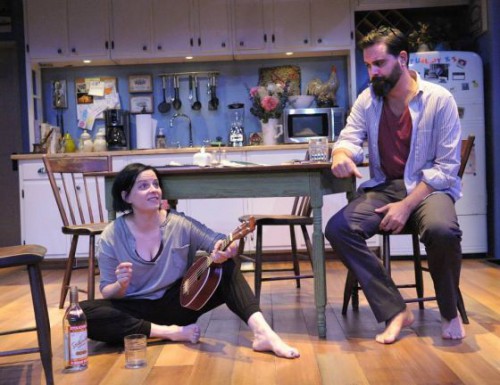 Reinventing theater is easier said than done – and easier still said with an expletive.
Reinventing theater is easier said than done – and easier still said with an expletive.
Thus we have Aaron Posner’s “Stupid @#$%ing Bird,” an adaptation of Chekhov’s “The Seagull” that just opened at the Woolly Mammoth Theatre Company in Washington D.C.
Using that supposedly edgy but ultimately limiting device of similarly titled plays like “The M@#$%er With the Hat” does provide an indication of the reckless linguistic approach within. Audiences are not just expected to see the word in the title or hear it in the play but expected to say it as well. This adaptation won’t start until someone yells “Start the @#$%ing play!” (and the jaded press night audience was only too willing to do so).
And once it begins, it’s clear that whatever its new title, the work is essentially the 1898 Chekhov work in slightly more contemporary language; the original story drives the work whatever the Cheking-hov on the stage.
Ever-tortured young playwright Conrad (adopted from Konstantin) begins by railing against the failures of theater, specifically mentioning how Shakespeare has been ruined by various cute approaches. How then to square that with this essentially cute approach to “The Seagull”?
Still, the call to new forms of theater remains a relevant one, even on a stage that’s done more than its part to stretch its definitions in its 33 seasons. Yet one of the strongest running jokes early on is that the work Conrad is about to present is actually “a site-specific performance piece.”
The lakeside performance given to his mother, an accomplished actress; her lover, a literary figure of note; an uncle and a couple of friends is a way to bring in a young actress with whom he is entranced (To emphasize the modernity of the already modern play, she immediately strips down to change into costume).
Basically her soliloquy boils down to repeating and explicating the phrase: “Here we are.” But the mother takes it badly. Her lover begins to flirt with the actress. And the couple of friends indulge in their own bouts of unrequited love.
None of this is as dreary as it sounds, though, as director Howard Shalwitz has amassed about as good a cast as you’ll see in D.C., who are as fun to watch even as the yearnings and wailing in the play continue.
Darius Pierce is the first you see on stage for any length of time, and his self-effacing schlub act sets the tone for what is a much funnier night than anyone could have expected. He is in love with Kimberly Gilbert’s character, a downer dressed in black to mourn her own life. As played by Gilbert, a shining light at Taffety Punk who has done plenty of shows at Woolly Mammoth, she emerges from her cloud with amusing downer ditties on her ukulele and a beautiful voice.
Of our central characters, Brad Koed as Conrad is full of life and woe, a fine figure of tortured young artist who is also called on to do a bit of ad libbing in the play as well. After turning to the audience to note, “Yeah, I realize this is a play too,” he asks the crowd for advice at one point – and they answer (For a moment I thought he’d act out their suggestions and turn Chekhov into improv night, but no).
Katie deBuys is the shining young beauty of his desire and she’s a perfect mix of ambition, enthusiasm and attraction.
Kate Eastwood Norris saunters around the stage like she owns it, and to play an actress of some years trying to maintain her life and dignity she may bring some of her own experiences.
Cody Nickell is her bearded, smug lover, an author whose fame dazzles the young ingénue and infuriates the would-be stepson.
Finally, Rick Foucheux adds a depth and substance to the cast, as he sees the desperate pitches for love something he’s long outgrown, yet he admires the feelings and emotions all around him. He, for one, liked the “performance piece.”
Because the Woolly Mammoth had the luxury to workshop several variations on the play over a long period of time, there is some snap timing and crackling asides in the ensemble work. It’s such a pleasure to watch each of the actors at work in their small gestures or eye rolls, shrugs and swoons, even when they have no lines. Their individual responses to the “performance piece” are priceless.
Chekhov was thought to be modern and subtle when he staged his suicide gunshots off stage instead of front and center, but even the bang (or being driven to do so) seems stagey 100 years later. Also missing are the subtexts of class and wealth to cut right to the issues of love and art.
People fleeing to the lobby for intermission are surprised to see a wholly different set from Misha Kachman on the return – instead of the impressionistic lake, a very specific kitchen of the lakehouse, where its residents saunter in and out in pajamas like ghosts with flesh and blood desires (and personal bottles of liquor).
Things are spread out again for act three, which occurs years later, with some things resolved, others just as troubling.
And because the ensemble is so good, maybe the crowd is reluctant at the end when they are asked to shout: “Stop the @#$%ing play!”